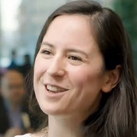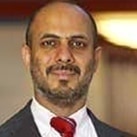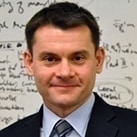AI/ML in Finance: Is It Just Another Bubble?

8 Oct 2019
08:00 -17:00
GMT
Registration for this event is closed.

London (venue tbc)
London
United Kingdom
Post event summary
This event provided an opportunity for practitioners in finance to learn about emerging research on how machine learning (ML) and artificial intelligence (AI) are being applied across finance, statistics and computer science.
Industry experts joined leading academics to discuss the impact of these applications in the financial sector. On the day we were joined by over 70 practitioners from the asset management industry and we explored the following themes:
- How artificial intelligence and machine learning are influencing the finance industry.
- Generating alpha – AI and machine learning.
- Predicting and detecting behaviour through machine learning.
- Towards a lasting human-AI interaction.
- How data privacy is shaping our use of large data sets.
- The market for data privacy.

Conference partner

Programme
Agenda
8 October 2019
08:00 – 08:30
Registration
08:30 – 08:35
Welcome
Dr Pedro Saffi, Reader in Finance, Cambridge Judge Business School
08:35 – 08:45
Introduction – How artificial intelligence and machine learning are influencing the finance industry
Dr Andrei Kirilenko, Senior Lecturer in Finance, Cambridge Judge Business School
08:45 – 10:15
Session 1: Generating alpha – AI and machine learning – uses in Investment Management
- Dr Carlos M. Carvalho, Professor of Statistics, McCombs School of Business, The University of Texas at Austin
- Time: 08:45-09:30
Carlos will present his work on Bayesian non-parametric regression models in predicting equity returns form characteristics. He will focus on model modifications that will incorporate economic information, time variability and explore ways to develop interpretable summaries of otherwise “black-box” strategies.
- Chaired by: Pedro Saffi, University of Cambridge
- Time: 09:30-10:15
The use of advanced statistical techniques is a driving force behind identifying alpha. The latest developments in AI/ML have been applied to identify good investment opportunities. The panellists will discuss how AI/ML are shaping this area, what challenges exist to implementation, and the role that academic research can have in addressing these.
Panellists:
- Carlos Carvalho, Professor of Statistics, McCombs School of Business, The University of Texas at Austin
- Daniel Philps, Head of Rothko Investment Strategies
Maximillian Stroh, Senior Research Analyst, Invesco Quantitative Strategies
10:15 – 10:45
Short break
10:45 – 12:15
Session 2: Predicting and detecting behaviour through machine learning
- Dr Artur D’avila Garcez, Professor of Computer Science at City University
- Time: 10:45-11:30
In neural-symbolic computing, symbolic AI is combined with deep learning to achieve reasoning and explainability of black-box deep networks. Artur will present recent developments in knowledge extraction from deep networks and illustrate its application to harm reduction in gambling. Ethical and knowledge consolidation aspects will be addressed. Explainability of time series forecasting will also be illustrated through the application of continual learning to investment decisions.
- Chaired by: Rasheed Saleuddin, University of Cambridge
- Time: 11:30-12:15
How AI and machine learning, in particular the analysis of large data sets, can be used to detect human behaviour, be it to identify financial misbehaviour or to understand an improve customer satisfaction.
Panellists:
- Artur D’avila Garcez, Professor of Computer Science at City University
- Deeptasree Mitra, Head of Cloud Data Platforms & Analytic Solutions, Deutsche Bank
- Keith Bear, Fellow at Cambridge Centre for Alternative Finance, Cambridge Judge Business School
- Dr Yasin Rosowsky, Head of AI, Arabesque Asset Management
12:15 – 13:30
Lunch break
13:30 – 15:00
Session 3: Towards a lasting human-AI interaction
- Time: 13:30-14:15
- Sameena Shah, Managing and Research Director in AI Research group at JP Morgan
- Chaired by Dr Andrei Kirilenko, Senior Lecturer in Finance, Cambridge Judge Business School
- Time: 14:15-15:00
Many applications of AI/ML are still perceived as “black boxes”: while we observe the output, we often cannot provide the reasoning behind it. As humans increase their reliance on recommendations made by machines, it is crucial to improve the ability to explain how decisions are made.
Panellists:
- Sameena Shah, Managing and Research Director in AI Research group at JP Morgan
- Curt Custard, CIO, Newton Investment Management
Antonia Lim, Head of Quantamental Investments, Schroders - Humayun Sheikh, Chief Executive and co-founder, Fetch.AI
15:00 – 15:25
Short break
15:25 – 16:55
Session 4: How data privacy is shaping our use of large data sets
- Time: 15:25-16:10
- Tarun Ramadorai, Professor of Financial Economics at Imperial College, London
Tarun will look at the supply of data privacy by scraping a comprehensive set of US firms’ privacy policies. The authors analyse these data with the help of expert legal evaluations, and also acquire data on firms’ web tracking activities. They find considerable and systematic variation in privacy policies along multiple dimensions including ease of access, length, readability, and quality, both within and between industries. Motivated by a simple theory of big data acquisition and usage, they analyse the relationship between firm size, knowledge capital intensity, and privacy supply. Large firms with intermediate data intensity have longer, legally watertight policies, but are more likely to share user data with third parties.
- Chaired by: Professor Raghavendra Rau, Professor in Finance, Cambridge Judge Business School, University of Cambridge
- Time: 16:10-16:55
What are the potential risks to investors of adopting AI/ML into investment process? Big data/alternative data underpin much of the success behind these techniques. This session will discuss how investors approach questions around data privacy, legal and regulatory ‘grey areas’ or the boundaries of insider information in developing alternative data sets.
Panellists:
- Tarun Ramadorai, Professor of Financial Economics at Imperial College, London
- Karen Croxson, Head of Research, Financial Conduct Authority (FCA)
- Sahar Bickford-Smith, Data privacy lawyer, BUPA Global
- Dr David Stillwell, Lecturer in Big Data Analytics & Quantitative Social Science, Cambridge Judge Business School
16:55 – 17:00
Closing remarks
Speakers
Pedro Saffi
Professor of Financial Economics, Cambridge Judge Business School, University of Cambridge
Pedro is a Professor of Financial Economics and Director of the Master of Finance Programme at Cambridge Judge Business School. His previous teaching experience has spanned North and South America, Asia and Europe. His consulting experience is centred on valuation, including work as an expert to international arbitration courts, and the analysis of pharmaceutical firms’ value. Pedro is a member of the Cambridge Corporate Governance Network. Before joining Cambridge, Pedro was Assistant Professor of Finance at IESE Business School in Barcelona, Spain.
Carlos Carvalho
Professor of Statistics, University of Texas McCombs School of Business
Carlos is the Executive Director of the Centre for Enterprise and Policy Analytics, a unit dedicated to supporting research, education and dialogue around the impact of economic policies on markets and the free enterprise system. Carlos’s main research interest focuses on Bayesian statistics in high-dimensional problems, with applications ranging from finance to genetics. His current projects include work on causal inference, machine learning, policy evaluation and empirical asset pricing.
Tarun Ramadorai
Professor of Financial Economics at Imperial College Business School
Tarun has written and published on household finance, asset pricing, technology, and international finance in a range of scholarly journals in finance and economics. In addition to his academic work, Tarun has taken on several advisory roles in both the public and private sector, including advising governments on policy in both India and Europe. He has a BA in Mathematics and Economics from Williams College, an MPhil in Economics from the University of Cambridge, and a PhD in Business Economics from Harvard University. Prior to his role at Imperial, Tarun spent over a decade at the University of Oxford.
Daniel Philps
Head of Rothko Investment Strategies
Dan Philps, CFA, is head of Rothko Investment Strategies and is an artificial intelligence (AI) researcher. He has 20 years of quantitative investment experience. Prior to Rothko, he was a senior portfolio manager at Mondrian Investment Partners. Before 1998, Philps worked as a quant developer at a number of investment banks, specialising in trading and risk models. He has a BSc (Hons) from King’s College London, is a CFA charter-holder, a member of CFA Society of the UK, holds a post graduate research role at London University, and is a member of the AAAI.
Keith Bear
Fellow at the Centre for Alternative Finance, Cambridge Judge Business School, University of Cambridge
Keith is focused on blockchain and fintech at CCAF, and is also working on a AI in Financial Services project in co-operation with the World Economic Forum. Prior to joining CCAF, Keith was responsible globally for the strategy and development of IBM’s business in Financial Markets, a multi-billion-dollar business. He worked extensively with global clients on their major transformation programs, typically on the cutting edge of shaping IBM’s solutions for the Financial Markets industry. He has worked extensively with trade finance organisations, financial markets infrastructure firms and leading global banks on the development of blockchain and AI solutions. Keith holds a first-class degree in physics from Corpus Christi College, Oxford, and a MSc with distinction in particle physics from the University of London.
Curt Custard
Executive Director and Chief Investment Officer at Newton Investment Management
Curt is responsible for all aspects of Newton’s global investment process and team. He joined Newton in 2017 to lead investment teams for the firm, including the portfolio managers, research analysts and the trading function. Prior to joining Newton, he served as the Managing Director and Head of Investment Solutions at UBS Global Asset Management (UK) Limited. He was also the Head of Global Investment Solutions and Portfolio Manager at UBS Global Asset Management (Americas) Inc. He had responsibility for asset allocation, currency strategies, advisory services, and developing an integrated risk analysis and management capabilities for application throughout the business.
Karen Croxson
Head of Research and Social Data Science, Financial Conduct Authority (FCA)
Karen lead’s the FCA’s scientific research programme, integrating economics, behavioural science and data science to understand markets, design evidence-based policy, and improve FCA internal operations. She is co-head of the Economics Department and is building a Social Data Science function at the regulator. She also represents the FCA on the Financial Stability Board’s Analytical Group on Vulnerabilities. Before joining the FCA Karen worked for McKinsey & Co. as a strategy consultant in Europe and the US. She later led data science work at QuantumBlack, McKinsey’s specialist data science agency. Her early career was focused on academic research as a postdoc at the University of Oxford and lecturer specialising in game theory and applied econometrics. She continues as a Guest Lecturer at Oxford and serves on the advisory board for the Social Data Science Masters and PhD programs there. She holds a PhD in Economics from the University of Oxford.
Maximillian Stroh
Senior Research Analyst, Invesco Quantitative Strategies
Maximilian Stroh joined Invesco as a Senior Research Analyst in 2018. He works on applying machine learning in the context of factor investing, developing the IQS data science infrastructure, and internal education on these topics. Previously, he was a research analyst with Quoniam Asset Management, where he investigated systematic credit, rates and multi-asset strategies. Before that, Maximilian worked as a quantitative analyst in the Applied Research team at Metzler Asset Management with a focus on option and volatility based strategies for absolute return funds. He has a PhD in mathematics as well as a “Diplom” in mathematics from the University of Frankfurt. Maximilian is a CFA charterholder and a member of the CFA Society Germany.
Antonia Lim
Head of Quantamental Investments, Schroders
Antonia joined Schroders in 2019 to lead their new initiative in quantamental investments, melding quantitative techniques with fundamental expertise and insight. Prior to Schroders, Antonia was Global Head of Quantitative Research for Barclays UK, designing its asset allocation policy, products and investment tools. She has two decades of experience in investment management, is a CFA charterholder and is on the management committee of the not-for-profit organisation London Quant Group. Antonia holds a Masters in Physics from the University of Oxford where she was awarded an academic scholarship. Antonia enjoys cross-disciplinary ideas and making those ideas useful.
Yasin Rosowsky
Head of Artificial Intelligence, Arabesque Asset Management
Yasin is Head of AI at Arabesque Asset Management – a global investment management and technology firm. Yasin and his team lead developments on Arabesque’s AI Engine which delivers investment recommendations for the purposes of portfolio management, working ultimately towards a ‘general AI’ engine within the financial space. He joined Arabesque in 2013 after completing his PhD in Machine Learning from the Computer Science department at University College London.
Artur D’avila Garcez
Director of the Research Centre for Machine Learning at City, University of London
Artur holds a PhD in Computing (2000) from Imperial College London. He is a Fellow of the British Computer Society (FBCS), member of the ACM, AAAI, IEEE, CGCA, and partner at Performance Systems, Rio de Janeiro, and Cognitive Intelligence, London. He is Director of the Research Centre for Machine Learning and Chair of the Data Science Institute at City, president of the Steering Committee of the Neural-Symbolic Learning and Reasoning Association, London, and founding director of City’s MSc in Data Science.
Sameena Shah
Managing and Research Director in AI Research group at JP Morgan
Sameena Shah is a Managing Director, and a Research Director in AI Research group at JPMorgan. She is a highly accomplished technology leader with over 20 years of educational and industry experience in engineering, AI, and leading development teams that created top AI technologies in the world for financial, news, commodities and legal businesses. Prior to joining JP Morgan, Sameena was Managing Director, Head of Data Science at S&P Global Ratings. One of her primary responsibilities included leading the firm’s strategy and build for Augmented Intelligence, a strategic program meant to transform the ratings value chain, allowing credit analysts to leverage AI in how they operate. Sameena has a PhD in Distributed Machine Learning and a Masters in Computer Science from IIT Delhi. She has 41 publications, 11 patents, and eight honors and awards, and is a frequent industry speaker.
Rasheed Saleuddin
Teaching Fellow in the Department of Economics and Research Associate at the Centre for Endowment Asset Management, University of Cambridge
Rasheed’s academic and professional interests currently lie in examining the theories, past experiences and current policy dilemmas related to involvement of the state in regulating financial industries, especially alternative finance. Before completing his PhD in history at the University of Cambridge as a fully-funded CERF Scholar, he was a hedge fund manager at the activist Canadian investment firm, West Face Capital. He is currently also an early stage investor in and advisor to fintech companies.
Deeptasree Mitra
Head of Cloud Data Platforms & Analytic Solutions, Deutsche Bank
Deeptasree has a long and successful track record in delivering and directing complex programmes and state of the art innovative data engineering solutions. Before joining Deutsche Bank in 2018, Deeptasree was responsible for delivering the technology behind the Bank of England’s. where she held the role of Head of data analytics and modelling. Deeptasree holds a degree in finance and management.
Raghavendra Rau
Professor in Finance, Cambridge Judge Business School, University of Cambridge and Academic Director of the Cambridge Centre for Alternative Finance
Besides the University of Cambridge, Raghavendra has taught at universities around the world, including the Institut d’Etudes Politiques de Paris (Sciences PO), Paris-Dauphine, the University of Luxembourg, Purdue University, the University of California at Los Angeles, and the University of California at Berkeley. Raghu was Principal at Barclays Global Investors, then the largest asset manager in the world, in San Francisco from 2008-09. He is also a past president of the European Finance Association, and a past editor of Financial Management. He serves on numerous academic editorial boards including the Journal of Corporate Finance, and the Journal of Banking and Finance. His research has frequently been covered by the popular press including the New York Times, the Financial Times, the Wall Street Journal, and the Economist, among others.
Sahar Bickford-Smith
Technology and Privacy Lawyer, BUPA Global
Sahar is a technology and privacy lawyer with multi-jurisdictional experience of advising on and negotiating technology contracts as well as embedding consequent design changes to technology itself. She currently heads a team of lawyers in BUPA advising on privacy by design in global technology change programs. The technology Sahar advises on ranges from cutting edge B2C technology, to software as a medical device, to enterprise technology i.e. PAAS in China. She previously worked at Symantec, focusing on digital applications, cloud services, social media and consumer protection across EMEA.
David Stillwell
Professor of Computational Social Science at Cambridge Judge Business School, University of Cambridge
David does consultancy on the topics of psychometrics, people analytics, and big data. He has worked on projects with companies including Amazon Payments, Barclays, Hilton Hotels, RBS, Shell, and Ubisoft. David published papers showing using social media data from millions of consenting individuals to show that the computer can predict a user’s personality as accurately as their spouse can. David has spoken at workshops organised by the EU Data Protection Supervisor, by the European Parliament’s Science and Technology Options Assessment Panel, to UK government regulators, and to the Bank of England.
Andrei Kirilenko
Professor of Finance, Cambridge Judge Business School, University of Cambridge
Andrei’s scholarly work lies in the intersection of finance, technology and regulation. Prior to joining Cambridge Judge in July 2019, Andrei was the Director of the Centre for Global Finance and Technology at the Imperial College Business School. Before joining Imperial in August 2015, Andrei was a Professor of the Practice of Finance at MIT Sloan and Co-Director of the MIT Center for Finance and Policy. Andrei served (2010-2012) as Chief Economist of the US Commodity Futures Trading Commission (CFTC) where he used modern analytical tools and methods to design and enforce an effective regulatory regime of financial markets. He spent 12 years at the International Monetary Fund working on financial crises around the world. Andrei received his PhD in Economics from the University of Pennsylvania with a specialisation in Finance from the Wharton School.
Humayun Sheikh
Chief Executive and co-founder of Fetch.AI.
Humayun is co-founder of Fetch.AI, which has developed the world’s first adaptive, self-organising ‘smart ledger’. Humayun is an entrepreneur with a track record of success and Fetch.AI is his fourth major venture. Humayun was a lead investor in DeepMind, having the vision to provide early-stage support to artificial intelligence and deep neural network technology. DeepMind was ultimately acquired by Google for $500m in 2014.
Papers and books presented
Bayesian Regression Tree Models for Causal Inference: Regularization, Confounding, and Heterogeneous Effects
P. Richard Hahn, Jared Murray, Carlos M. Carvalho
Measurable Counterfactual Local Explanations for Any Classifier
Adam White, Artur d’Avila Garcez
Neural-Symbolic Learning Systems
Artur S. d’Avila Garcez, Krysia Broda, Dov M.Gabbay
Neural-Symbolic Cognitive Reasoning
Artur S. d’Avila Garcez, Luís C. Lamb, Dov M.Gabbay
The Market for Data Privacy
Tarun Ramadorai, Antoine Uettwiller, Ansgar Walther
Keynote presentations
Carlos Carvalho
Artur d’Avila Garcez
Tarun Ramadorai
Keith Bear




















